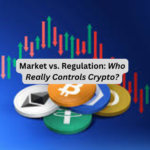
Europe Tightens Crypto Regulations: Stricter Guidelines Spark Debate on Overregulation
The European Banking Authority (EBA) has taken a significant step in shaping the future of cryptocurrency regulation by introducing stricter guidelines to combat fraud and enhance compliance. These measures are aimed at ensuring the safety and integrity of the European crypto market, but they’ve also sparked a heated debate among industry players who fear the potential downsides of overregulation.
What do these new regulations entail, and how could they impact the growth of the crypto industry in Europe? Let’s take a closer look at this controversial development.
1. The EBA’s Stricter Crypto Guidelines: What’s Changing?
The European Banking Authority, a regulatory agency overseeing financial institutions across the EU, has rolled out new compliance rules aimed at mitigating risks in the cryptocurrency sector.
Key Measures Introduced
- Stronger Anti-Fraud Protocols
- Crypto platforms must implement advanced measures to detect and prevent fraudulent activities, including transaction monitoring tools and enhanced customer verification processes.
- Enhanced KYC/AML Requirements
- Stricter Know Your Customer (KYC) and Anti-Money Laundering (AML) standards will require platforms to gather more data on users to ensure transparency and traceability of funds.
- Increased Reporting Obligations
- Exchanges and wallet providers must submit detailed activity reports to regulatory authorities, ensuring compliance with financial laws.
- Consumer Protection Measures
- Platforms must disclose risks more clearly to users and ensure better safeguarding of customer funds against cyberattacks or insolvencies.
The EBA’s ultimate goal is to increase market integrity, reduce criminal activity, and enhance investor confidence in cryptocurrencies.
2. Industry Response: Balancing Security and Innovation
While some welcome the stricter guidelines as necessary steps toward market stability, others argue they could stifle innovation and growth in the crypto space.
Supporters of the New Regulations
- Fraud Prevention: Advocates highlight that the stricter measures could reduce scams and improve trust among institutional and retail investors.
- Institutional Adoption: Clearer rules may encourage more traditional financial institutions to participate in the crypto market, knowing compliance standards are robust.
- Global Leadership: By establishing comprehensive guidelines, Europe could position itself as a leader in regulating the digital asset economy.
Critics of Overregulation
- Innovation at Risk: Many crypto startups fear that the high costs of compliance will hinder innovation and limit opportunities for smaller players.
- Loss of Privacy: Stricter KYC/AML measures may conflict with crypto’s ethos of decentralization and user privacy.
- Market Exodus: There’s a growing concern that overregulation could drive companies and talent to crypto-friendly regions like Dubai, Singapore, or the U.S.
3. Implications for Crypto Businesses in Europe
The new EBA guidelines could have significant effects on crypto businesses operating in Europe:
Increased Compliance Costs
- Crypto exchanges and wallet providers will need to allocate more resources to meet the new regulatory requirements, such as upgrading fraud detection tools or hiring compliance specialists.
Stricter User Onboarding
- With enhanced KYC rules, onboarding processes may become more complex and time-consuming, potentially deterring new users.
Innovation Slowdown
- Startups and smaller projects may struggle to adapt to the new guidelines, potentially limiting Europe’s ability to foster cutting-edge blockchain innovation.
4. What Does This Mean for Crypto Users?
For European crypto users, the EBA’s stricter guidelines could bring both benefits and challenges:
Pros for Users:
- Safer Platforms: Users may feel more secure knowing that platforms are adhering to higher standards of fraud prevention and compliance.
- Market Transparency: Increased reporting and disclosure could make the crypto market more trustworthy and easier to navigate.
Cons for Users:
- Reduced Privacy: Stricter KYC/AML requirements may force users to disclose more personal information, conflicting with the privacy ideals of cryptocurrency.
- Limited Access to Platforms: Some smaller exchanges or wallet providers may cease operations in Europe due to compliance costs, reducing options for users.
5. The Bigger Debate: Regulation vs. Innovation
The EBA’s move highlights a broader tension in the crypto industry: how to regulate effectively without stifling growth.
Regulation as a Catalyst
Some argue that clear guidelines are essential to mainstream adoption:
- They create a safer environment for new users and institutions to enter the space.
- They help combat the negative perception of crypto as a tool for illicit activities.
Regulation as a Barrier
Others warn that overly strict rules could backfire:
- By prioritizing security over flexibility, regulators risk limiting the innovative potential of blockchain and crypto projects.
- The decentralized ethos of blockchain technology may be compromised under rigid compliance frameworks.
6. The Global Context: Europe vs. Other Crypto Hubs
Europe’s stricter guidelines come at a time when other regions are adopting varying approaches to crypto regulation:
U.S. Approach:
- The U.S. remains divided on crypto regulation, with the SEC taking a hardline approach while Congress debates clearer guidelines.
Asia’s Crypto-Friendly Policies:
- Countries like Singapore and Hong Kong are positioning themselves as crypto hubs by implementing balanced regulations that encourage innovation while protecting investors.
Middle East’s Attractiveness:
- The UAE, particularly Dubai, has become a crypto-friendly destination with clear regulatory frameworks that attract blockchain startups.
Europe’s move toward stricter compliance could either solidify its position as a global leader in crypto regulation or push innovation toward these crypto-friendlier jurisdictions.
7. What’s Next?
The rollout of the EBA’s stricter guidelines marks the beginning of a new chapter for crypto regulation in Europe.
Key Developments to Watch:
- Industry Adaptation: How will exchanges and wallet providers adjust to the new rules?
- User Reactions: Will stricter KYC/AML measures affect user engagement and onboarding?
- Regulatory Updates: Will other regions follow Europe’s lead, or will they offer more relaxed frameworks to attract crypto businesses?
Conclusion: Striking the Right Balance
The European Banking Authority’s stricter crypto guidelines underscore the growing importance of regulation in the cryptocurrency space. While the measures aim to combat fraud and enhance compliance, they also raise concerns about stifling innovation and driving talent and businesses elsewhere.
As Europe navigates this delicate balance between security and innovation, the global crypto community will be watching closely. Whether these guidelines help or hinder the industry remains to be seen, but one thing is clear: regulation will play a central role in shaping the future of crypto.
FAQs
1. What are the new EBA crypto guidelines?
The EBA’s guidelines introduce stricter KYC/AML requirements, enhanced fraud prevention tools, increased reporting obligations, and stronger consumer protections.
2. Why are some people concerned about overregulation?
Critics argue that overly strict regulations could stifle innovation, increase compliance costs for startups, and drive businesses to crypto-friendly regions.
3. How do these regulations affect users?
Users may benefit from safer platforms and greater transparency but face reduced privacy and fewer platform options due to higher compliance costs.
4. How does Europe’s approach compare to other regions?
Europe is taking a stricter stance compared to regions like Dubai or Singapore, which aim to balance regulation and innovation to attract crypto businesses.
For more updates on crypto regulations and their global impact, visit CryptoLiveLeak.org!
















